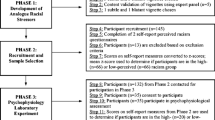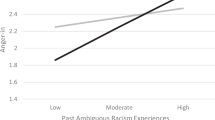Abstract
It has been speculated that exposure to the chronic stress of racism contributes to the high rates of hypertension among African Americans. Social support may buffer the effects of stress on cardiovascular (CV) health by attenuating stress-induced CV responses that have been linked to hypertension. In this study we investigated the effects of racism and social support on CV reactivity in African American women. Participants showed greater increases in CV and emotional responses while responding and listening to racist provocation. Augmented blood pressure (BP) persisted through recovery following racial stress. Participants receiving no support showed the greatest increases in anger during racist provocation. No significant effects were seen for support on CV reactivity. These results provide some of the first evidence that interactive confrontation with racism elicits significant increases in CV reactivity and emotional distress. Furthermore, individuals receiving less support may be at greater risk for the potentially health-damaging effects of racial stress. These findings may have significant implications for the health of African Americans.
Similar content being viewed by others
References
Antonucci, T. C., & Akiyama, H. (1987). An examination of sex differences in social support in mid and late life.Sex Roles, 17, 737–749.
Armstead, C. A., Lawler, K. A., Gorden, G., Cross, J., & Gibbons, J. (1989). Relationship of racial stressors to blood pressure responses and anger expression in black college students.Health Psychology, 8, 541–556.
Berkman, L. F., & Syme, S. L. (1979). Social networks, host resistance, and mortality: A nine-year follow-up study of Alameda County residents.American Journal of Epidemiology, 109, 186–204.
Biegel, D. E., Magaziner, J., & Baum, M. (1991). Social support networks of White and Black elderly people at risk for institutionalization.Health and Social Work, 16, 245–257.
Bland, S. R., Krogh, V., Winkelstein, W., & Trevisan, M. (1991). Social network and blood pressure: A population study.Psychosomatic Medicine, 53, 598–607.
Blazer, D. G. (1982). Social support and mortality in an elderly community population.American Journal of Epidemiology, 115, 684–694.
Boyce, W., & Chesterman, E. (1990). Life events, social support, and cardiovascular reactivity in adolescence.Journal of Developmental and Behavioral Pediatrics, 11, 105–111.
Broadhead, W. E., Kaplan, B. H., James, S. A., Wagner, E. H., Schoenbach, V. J., Grimson, R., Heyden, S., Tibblin, G., & Gehlback, S. H. (1983). The epidemiologic evidence for a relationship between social support and health.American Journal of Epidemiology, 117, 521–537.
Brownell, A., & Shumaker, S. A. (1984). Social support: An introduction to a complex phenomenon.Journal of Social Issues, 40, 1–9.
Chapman, A., Mandryk, A. J., Frommer, M. S., Edye, B. V., & Ferguson, D. A. (1990). Chronic perceived work stress and blood pressure among Australian government employees.Scandinavian Journal of Work, Environment & Health, 16, 258–269.
Cohen, S., & McKay, G. (1984). Social support, stress, and the buffering hypothesis: A theoretical analysis. In A. Baum, S. E. Taylor. & J. E. Singer (Eds.),Handbook of psychology and health (Vol. 4, pp. 253–268). Hillsdale, NJ: Lawrence Erlbaum Associates, Inc.
Cross, W. E. (1991).Shades of Black: Diversity in African American identity. Philadelphia: Temple University Press.
Dovidio, J. F., & Gaertner, S. L. (Eds.). (1986). Prejudice, discrimination, and racism. New York: Academic.
Dressler, W. W. (1985). Extended family relationships, social support, and mental health in a Southern Black community.Journal of Health and Social Behavior, 26, 39–48.
Dressler, W. W. (1990). Lifestyle, stress, and blood pressure in a southern Black community.Psychosomatic Medicine, 52, 182–198.
Dressler, W. W. (1991). Social support, lifestyle incongruity, and arterial blood pressure in a southern Black community.Psychosomatic Medicine, 53, 608–620.
Dressler, W. W., dos Santos, J. E., & Viteri, F. E. (1986). Blood pressure, ethnicity, and psychosocial resources.Psychosomatic Medicine, 48, 509–519.
Dressler, W. W., Grell, G. A., Gallagher, P. N., & Viteri, F. E. (1992). Social factors mediating social class differences in blood pressure in a Jamaican community.Social Science and Medicine, 35, 1233–1244.
Dressler, W. W., Mata, A., Chavez, A., Viteri, F. E., & Gallagher, P. (1986). Social support and arterial pressure in a central Mexican community.Psychosomatic Medicine, 48, 338–350.
Edens, J. L., Larkin, K. T., & Abel, J. L. (1992). The effect of social support and physical touch on cardiovascular reactions to mental stress.Journal of Psychosomatic Research, 36, 371–381.
Field, D., & Minkler, M. (1988). Continuity and change in social support between young-old and old-old or very-old age.Journal of Gerontology, 43(4), 100–106.
Gerin, W., Milner, D., Chawla, S., & Pickering, T. G. (1995). Social support as a moderator of cardiovascular reactivity in women: A test of the direct effects and buffering hypotheses.Psychosomatic Medicine, 57, 16–22.
Gerin, W., & Pickering, T. G. (1995). Association between delayed recovery of blood pressure after acute mental stress and parental history of hypertension.Journal of Hypertension, 13, 603–610.
Gerin, W., Pieper, C. F., Levy, R., & Pickering, T. G. (1992). Sodal support in social interaction: A moderator of cardiovascular reactivity.Psychosomatic Medicine, 54, 324–336.
Hall, W. D. (1985). Pharmacological therapy of hypertension in Blacks. In W. D. Hall, E. Saunders, & N. Schulman (Eds.),Hypertension in Blacks, epidemiology, pathophysiology, and treatment (pp. 182–208). Chicago: Yearbook Medical Publishers.
Hardy, J. D., & Smith, T. W. (1988). Cynical hostility and vulnerability to disease: Social support, life stress, and physiological response to conflict.Health Psychology, 7, 447–459.
House, J. S., Robbins, C. & Metzner, H. L. (1982). The association of social relationships and activities with mortality: Prospective evidence from the Tecumseh community health study.American Journal of Epidemiology, 116, 123–140.
Isaksson, H., Konarski, K., & Theorell, T. (1992). The psychological and social condition of hypertensives resistant to pharmacological treatment.Social Science and Medicine, 35, 869–875.
Jaynes, G. D., & Williams, R. M., Jr. (1989). A common destiny: Blacks and American society. Washington, DC: National Academy Press.
Jemmott, J. (1987). Social motives and susceptibility to disease: Stalking individual differences in health risks [Special issue: Personality and physical health].Journal of Personality, 55, 267–298.
Jung, J. (1990). Global versus health-specific social support and match of preferred and perceived social support levels in relationship to compliance and blood pressure of hypertension.Journal of Applied Social Psychology, 20, 1103–1111.
Kamarck, T. W., Manuck, S. B., & Jennings, J. R. (1990). Social support reduces cardiovascular reactivity to psychological challenge: A laboratory model.Psychosomatic Medicine, 52, 42–58.
Kaplan, G. A., Salonen, J. T., Cohen, R. D., Brand, R. S., Syme, S. L., & Puska, P. (1988). Social connections and mortality from all causes and from cardiovascular disease: Prospective evidence from eastern Finland.American Journal of Epidemiology, 128, 370–380
Katz, P. A., & Taylor, D. A. (1988).Eliminating racism: Profiles in controversy. New York: Plenum.
Knox, S. S. (1993). Perceptions of social support and blood pressure in young men.Perceptual and Motor Skills, 77, 132–134.
Landerman, R., George, L. K., Campbell, R. T., & Blazer, D. G. (1989). Alternative models of the stress buffering hypothesis.American Journal of Community Psychology, 17, 625–642.
Lepore, S. J., Allen, K. A., & Evans, G. W. (1993). Social support lowers cardiovascular reactivity to an acute stressor.Psychosomatic Medicine, 55, 518–524.
Lercher, P., Hortnagl, J., & Kofler, W. W. (1993). Work noise annoyance and blood pressure: Combined effects with stressful working conditions.International Archives of Occupational & Environmental Health, 65, 23–28.
Linden, W., Chambers, L., Maurice, J., & Lenz, J. W. (1993). Sex differences in social support, self-deception, hostility, and ambulatory cardiovascular activity.Health Psychology, 12, 376–380.
Malcolm, A. T., & Janisse, M. D. (1991). Additional evidence for the relationship between Type A behavior and social support in men.Behavioral Medicine, 17, 131–134.
Manuck, S. B., Kasprowicz, A. L., & Muldoon, M. F. (1990). Behaviorally-evoked cardiovascular reactivity and hypertension: Conceptual issues and potential associations.Annals of Behavioral Medicine, 12, 17–19.
Moller, L., Kristensen, T. S., & Hollnagel, H. (1991). Social class and cardiovascular risk factors in Danish men.Scandinavian Journal of Social Medicine, 19, 116–126.
National Center for Health Statistics. (1992).Health, United States, 1991. Hyattsville, MD: Public Health Service.
Orth-Gomer, K., & Johnson, J. V. (1987). Social network interaction and mortality: A six-year follow-up study of a random sample of the Swedish population.Journal of Chronic Diseases, 40, 949–957.
Ostrow, D. G., Whitaker, E. D. R., Frasier, K., Cohen, C., Wan, J., Frank, C., & Fisher, E. (1991). Racial differences in social support and mental health in men with HIV infection: A pilot study.AIDS CARE, 3, 55–62.
Pickering, T. C., & Gerin, W. (1990). Cardiovascular reactivity in the laboratory and the role of behavioral factors in hypertension: A critical review.Annals of Behavioral Medicine, 12, 3–16.
Roberts, J., & Rowland, M. (1981).Hypertension in adults 25–74 years of age: United Slates, 1971–75 (DHHS Publication No. PHS 81-1671; Vital and Health Statistics, Series 11, No. 221). Hyattsville, MD: U.S. Government Printing Office.
Sallis, J. F., Trevorrow, T. R., & Johnson, C. (1987). Worksite stress management: A comparison of programs.Psychology and Health, 1, 237–255.
Schuman, H., Steeth, C. & Bobo, L. (1985).Racial attitudes in America: Trends and interpretations. Cambridge, MA: Harvard University Press.
Smith, M. A., & Houston, B. K. (1987). Hostility, anger expression, cardiovascular responsivity and social support.Biological Psychology, 24, 39–48.
Spicer, J., Jackson, R., & Scragg, R. (1993). The effects of anger management and social contact on risk of myocardial infarction in Type A’s and B’s.Psychology and Health, 8, 243–255.
Strogatz, D. S., & James, S. A. (1986). Social support and hypertension among blacks and whites in a rural, southern community.American Journal of Epidemiology, 124, 949–956.
Taylor, R., & Chatters, L. (1989), Family, friend, and church support networks of Black Americans. In R. I. Jones (Ed.),Black development and aging (pp. 245–271). Berkely. CA: Cobb-Henry Publisher
Uchino, B. N., Kieolt-Glaser, J. K., & Cacioppo, J. T. (1992). Age-related changes in cardiovascular response as a function of a chronic stressor and social support.Journal of Personality and Social Psychology, 63, 839–846.
Uchino, B. N., Kiecolt-Glaser, J. K., & Cacioppo, J. T. (1994). Construals of pre-illness relationship quality predict cardiovascular response in family caregivers of Alzheimer’s disease victims.Psychology and Aging, 9, 113–120.
U.S. Department of Health and Human Services. (1986).Report of the Secretary’s Task Force on Black and Minority Health (1986). Volume IV: Cardiovascular and cerebrovascular disease, Part I. Washington, DC: Author.
Weinberger, M., Hiner, L. S., & Tierney, W. M. (1987). Assessing social support in elderly adults.Social Science Medicine, 25, 1049–1055.
Wellman, D. (1977).Portraits of White racism, Cambridge, England: Cambridge University Press.
Wilson, W. J. (1973).Power, racism, and privilege. New York: Free Press.
Zajonc, R. B. (1965). Social facilitation.Science, 149, 269–274.
Author information
Authors and Affiliations
Additional information
This research was supported by a National Institutes of Health (NIH), NHLBI FIRST AWARD, grant HL462I8-03; an NIH, NHLBI grant HL41335; and an NIH, NIA grant P20AG12058.
We acknowledge the exceptional assistance of Laura Winnie, along with Jaye Efiand, Sanjay Vanguri, Emily Spilseth, Dawn Bodo, and Tounya Ebanks in the preparation and conduct of this study.
Rights and permissions
About this article
Cite this article
McNeilly, M.D., Robinson, E.L., Anderson, N.B. et al. Effects of racist provocation and social support on cardiovascular reactivity in african american women. Int. J. Behav. Med. 2, 321–338 (1995). https://doi.org/10.1207/s15327558ijbm0204_3
Issue Date:
DOI: https://doi.org/10.1207/s15327558ijbm0204_3




